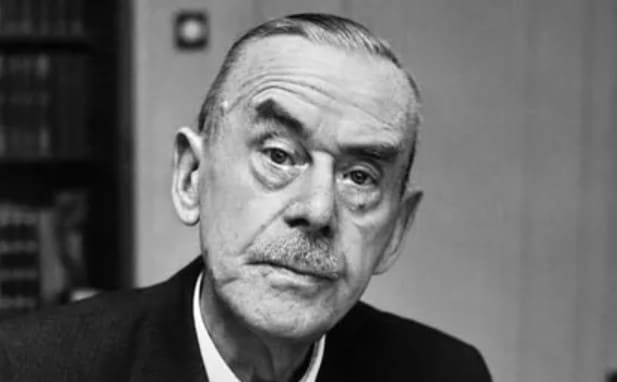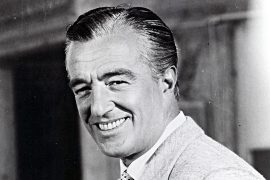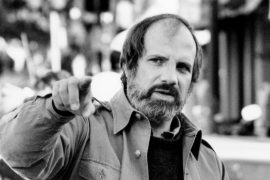The German writer is one of the most important novelists and most outstanding essayists of the 20th century. He is considered a master of irony and literary mannerism. Thomas Mann wrote short stories and novels that reflect the end of the bourgeois era. As a traditionalist, he consciously placed himself in the footsteps of the educated middle classes and poets such as Johann Wolfgang von Goethe and Theodor Fontane. His large-scale family saga “Buddenbrooks”, for which he was awarded the Nobel Prize, achieved literary world fame. In his works, the author often appears as a defender of European humanistic culture – often realized in a commenting, reasoning-ironic attitude…
Thomas Mann was born as the son of the merchant and senator Johann Heinrich Mann and his wife Julia, née da Silva-Bruhns, on June 6, 1875 in Lübeck.
Mann grew up with four siblings: Heinrich (1871-1950), Julia (1877-1927), Carla (1881-1910) and Karl Victor (1890-1949). He first attended a private school in his native town, later he switched to the Realgymnasium there. After the death of his father in 1891, the company was sold and two years later the family moved to Munich. There Mann began a traineeship with an insurance company, which he gave up again. A small pension gave him the financial security he needed to become a freelance writer. His brother, Heinrich Mann, also pursued this career. From 1896 to 1898 Thomas Mann lived in Italy. After his return he was briefly an editor of the magazine “Simplicissimus”. From 1900 he did his military service. In 1905 he married the wealthy Munich professor’s daughter and student Katja Pringsheim. The marriage was to bring his homoerotic inclinations into a contemporary bourgeois constitution. The marriage produced a total of six children.
The success of the family saga “Buddenbrooks” (1897-1900) and his marriage to Katja Pringsheim enabled the writer to lead the life of a bourgeois. Thomas Mann countered his brother Heinrich Mann’s attitude towards the First World War as political activism with polemical and national-conservative statements such as “civilization writers”; they became the cause of a fratricidal quarrel that lasted for years. In 1919 Thomas Mann was awarded an honorary doctorate from the University of Bonn. With the end of the war, Thomas Mann campaigned for democracy and was a supporter of the Weimar Republic. In 1922 the brotherly relationship was restored. Mann was awarded the Nobel Prize for Literature in 1929 for his opulent novel “Buddenbrooks”. Even before the National Socialists seized power in 1933, the writer acted as a warning against the brown menace. In the year in question he had long since moved to Switzerland. It was not until 1936 that he publicly acknowledged his existence as an emigrant.
Mann became a Czechoslovakian citizen. In addition to the deprivation of German citizenship, he was also deprived of his honorary doctorate. After Austria was “connected” to the German Reich in 1938, Thomas Mann withdrew to the USA. There he first lived in Princeton and worked as a visiting professor. In 1941 he moved to Pacific Palisades near Los Angeles. During the war from 1940 to 1945 his monthly speeches “Deutsche Hörer!” sent to Germany by the BBC. Shortly before the end of the war in 1944, he became an American citizen. His public letter “Why I don’t return to Germany” from 1945, in which the author expressed his view of the collective guilt of the Germans, provoked widespread critical resistance. With his Goethe speeches on his first visit to Germany after the end of the war in 1949, Thomas Mann once again triggered fierce criticism. In 1952 Mann moved to Erlenbach near Zurich and in 1954 he settled in Kilchberg.
With the exception of the drama “Fiorenza” (1906) and the idyll “Gesang vom Kindchen”, Thomas Mann wrote only prose. He supplemented his literary genre focus on novels and stories with essays and journalistic works with recurring themes of bourgeoisie, being an artist, myth, life, spirit or decadence. Before his first big success with the “Buddenbrooks” he created the collection of short stories “Der kleine Herr Friedmann” in 1898. The Nobel Prize novel then tells of the decadence of the Buddenbrooks in epic breadth, which the writer associates with Schopenhauer’s philosophy. The ambivalence between art and bourgeoisie is the subject of the stories “Tonio Krüger” and “Tristan” (1903) and in the novella “Death in Venice” (1912). In the period novel “Der Zauberberg” (1925), Mann describes, among other things, the years before the First World War and the decadence of contemporary society.
In his most extensive piece, the Joseph Tetralogy 1933-1943, the writer exemplifies the mythical tradition of the spirit. His novel “Lotte in Weimar” (1939) represents a high point in Mann’s preoccupation with Goethe, in which he contrasts his enlightened attitude with contemporary conditions. In his novel “Doktor Faustus” (1947) lifelong social conditions are discussed, such as the development of German fascism and its downfall. In his last novel, “The Confessions of Felix Krull the Conman” (1954), Mann parodies the Bildungsroman and the question of being an artist and of narcissism.
Thomas Mann died in Zurich on August 12, 1955.
What is special about Thomas Mann?
Loved, hated and read a lot – Thomas Mann is one of the most important German writers of the 20th century. But during his lifetime he polarized: he was too intellectual for the conservatives, too German for the left and too bourgeois for his fellow writers.
Why is Thomas Mann so important?
With his work, THOMAS MANN took the tradition of the great realists of the 19th century to a final climax. In addition to LEW TOLSTOJ, JOHANN WOLFGANG VON GOETHE was one of his role models; he himself was one of the most important storytellers of the 20th century.
What religion did Thomas Mann belong to?
Thomas Mann, who played an important role as a politically engaged author in exile during the National Socialist period, repeatedly described himself as a philo-Semite, fought for the recognition of the discriminated Jewish minority and was associated with a number of Jewish intellectuals whom he very much …
Where did Thomas Mann stand politically?
He was initially skeptical about Western democracy, but by the early 1920s he had become a staunch defender of the Weimar Republic. During the National Socialist regime he emigrated to Switzerland in 1933 and to the USA in 1938, where he became a citizen in 1944.





